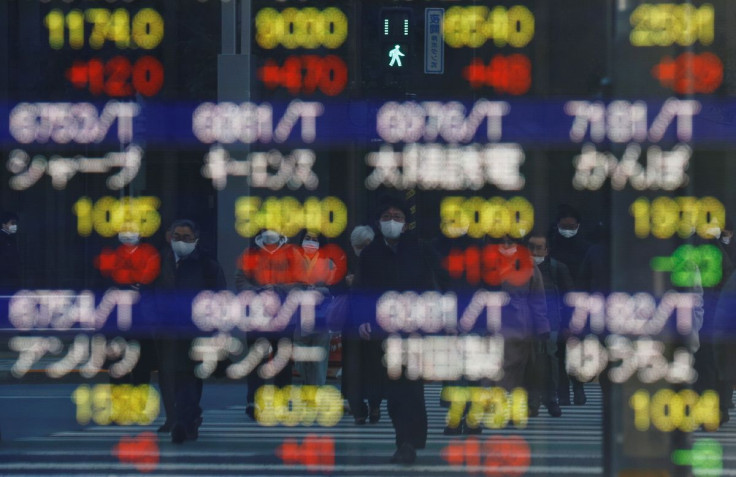Prospect Of Fed Firing On All Cylinders Spooks Bonds

Wall Street was headed lower on Wednesday, taking its cue from weaker global shares after U.S. Treasuries were pummelled on the prospect of the Federal Reserve firing on all cylinders next month to quell inflation.
Investors also waited for details of the latest package of coordinated sanctions on Russia from the United States and its allies over civilian killings in Ukraine.
The dollar hit its highest in almost two years, while expectations of new sanctions raised oil supply concerns to send crude prices higher.
S&P500 futures were down 0.9%, with tech-heavy Nasdaq futures off 1.6%, pointing to a second day of selling.
The CBOE Volatility index, widely dubbed Wall Street's fear index, rose to 23.25 points, up 10.5%.
The MSCI All-Country stock index shed 0.5% as shares fell in Asia and Europe, after Fed Governor Lael Brainard said overnight she expected a combination of interest rate rises and a rapid balance sheet runoff to take U.S. monetary policy to a "more neutral position" later this year.
Randy Kroszner, a former Fed Governor and now an economics professor at the University of Chicago Booth School of Business, said the Fed was right to act now while longer-term inflation expectations remained anchored.
"Given that we've had significant 8% inflation and it's likely to persist for quite some time, longer-term inflation expectations have not yet become unanchored," Kroszner said.
"So, they (Fed policymakers) have the opportunity to maintain credibility, but they need to act boldly and that means rapid rate increases, that means a more rapid winding down of the balance sheet than they would have wanted to do."
The focus of investors on Wednesday will be on the release of minutes from the Fed's last policy meeting, out at 1800 GMT.
"The minutes will be important for two main reasons. First, for clues on the likelihood of a 50 basis point hike, and what the committee would need to see to warrant a faster pace of hikes," analysts at UniCredit said in a note to clients.
RECESSION RISK
The gap between 2 and 10-year bond yields was at almost 5 basis points. This closely-watched part of the U.S. yield curve, viewed as a good indicator of recession risk, had been inverted for much of the past week.
The yield on benchmark 10-year Treasury notes rose to 2.625%, hitting a three-year high after Brainard's remarks.
The U.S. 2-year yield rose to its highest level since January 2019 and the 5-year yield to its highest since December 2018. [US/]
DOLLAR HITS 2-YEAR HIGH
The dollar index hit 99.386 after reaching its highest since late May 2020 in early trade. The euro was slightly firmer at $1.0923.
The greenback was also trading firm against the yen at 123.80 yen given the Bank of Japan's conviction and repeated action last week to hold the yield on 10-year Japanese government bonds below 0.25%.
Grace Peters, EMEA head of investment strategy at JPMorgan Private Bank, said 2022 was probably the last year of above-trend economic growth.
"We are seeing Fed policy rapidly moving into restrictive territory. But we don't need to ditch equities, it just means we need to be more risk aware. At this point I would buy the dips but move into higher-quality assets," Peters said.
"Markets see the curve inversion as the clock ticking down to the next recession. But it can be up to two years until recession hits and over that period stocks generally see a double-digit upside," she said.
CRUDE GAINS
The rise in bond yields globally has put pressure on gold, which pays no return. Spot gold slightly weaker at $1,923 per ounce. [GOL/]
Oil prices recovered from early losses as the threat of new sanctions on Russia raised supply concerns, but there were fears of weaker demand following an increase in U.S. crude stockpiles and Shanghai's extended lockdown.
U.S. crude was up 0.9% at $102.75 a barrel. Brent crude gained 0.5% to $107.20 per barrel. [O/R]
In Asia, Hong Kong's Hang Seng index lost 1.8% on its return from a holiday, moving away from a one-month high reached on Monday, Chinese blue chips lost 0.3%.
Japan's Nikkei shed 1.6%, while the MSCI's broadest index of Asia-Pacific shares outside Japan skidded 1.3%.
© Copyright Thomson Reuters 2024. All rights reserved.




















